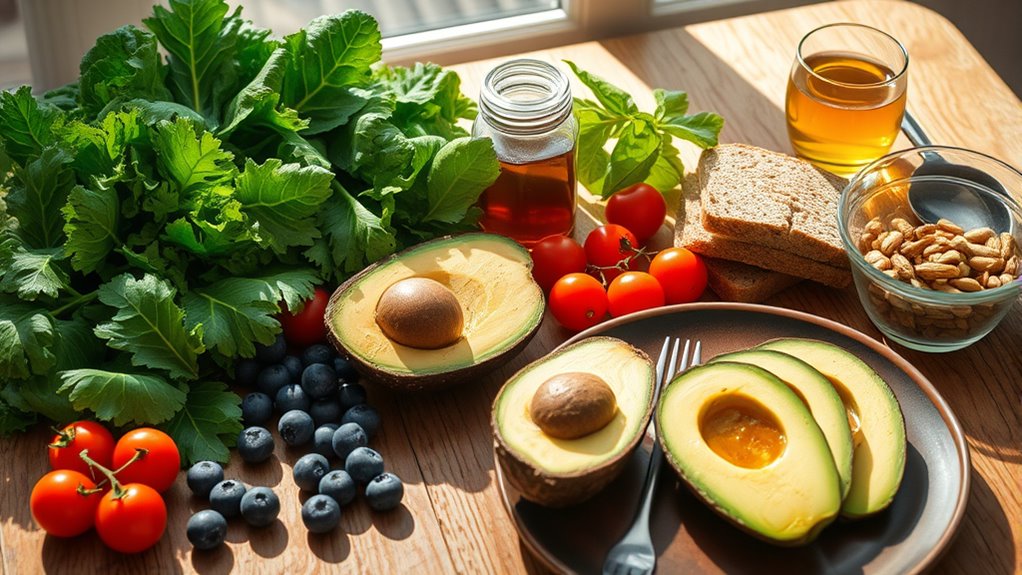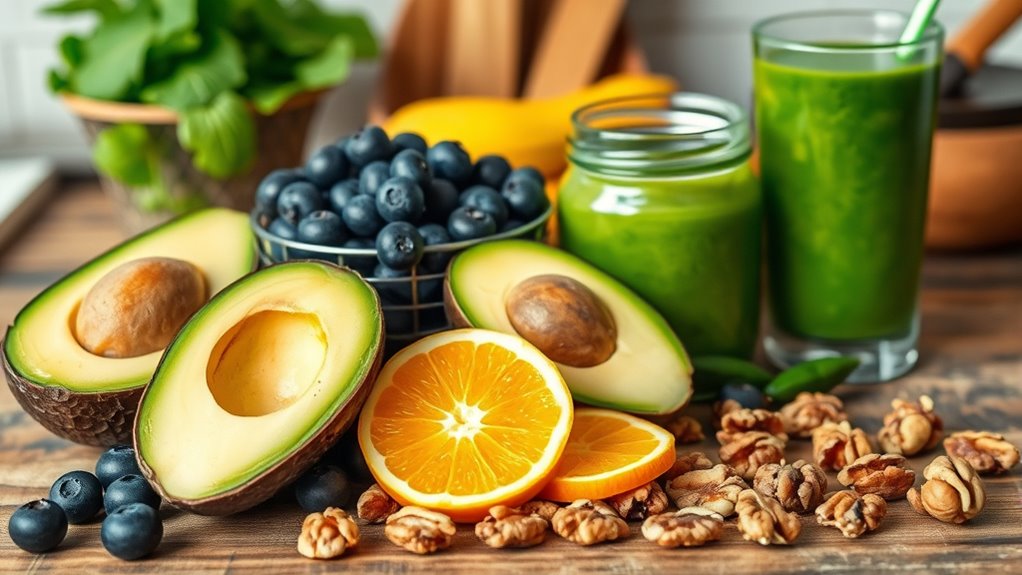To incorporate functional foods into your weekly meal plan, include probiotic-rich options like yogurt, kefir, sauerkraut, and kimchi daily. Add prebiotic foods such as garlic, onions, leeks, and asparagus to nourish your gut bacteria. Balance fermented foods with fiber-rich vegetables and make small, consistent dietary adjustments. By doing so, you’ll support digestion, mood, and overall gut health—if you want to learn more about optimizing your meals, keep exploring these simple tips.
Key Takeaways
- Incorporate probiotic-rich foods like yogurt, kefir, sauerkraut, and kimchi into daily meals as snacks or breakfast.
- Add prebiotic vegetables such as garlic, onions, leeks, and asparagus to salads and main dishes to nourish gut bacteria.
- Balance probiotic and prebiotic foods throughout the week to promote a diverse and healthy gut microbiome.
- Use fermented foods with live cultures as side dishes to enhance gut health and digestion.
- Make consistent, small dietary adjustments over time and explore online resources for guidance on functional food integration.

Incorporate probiotic-rich foods like yogurt, kefir, sauerkraut, and kimchi to promote a balanced gut microbiome. Prebiotic ingredients like garlic, onions, leeks, and asparagus also support gut health by nourishing beneficial bacteria. These gut health strategies can improve digestion, reduce bloating, and even enhance mood. Think about starting your day with a probiotic yogurt or adding a handful of prebiotic-rich vegetables to your salads. Small, consistent adjustments like these can have a significant impact over time. Additionally, choosing fermented foods that contain live cultures can further enhance your gut flora and overall digestive health.
Frequently Asked Questions
Can Functional Foods Replace Traditional Medications Safely?
Functional foods can’t fully replace traditional medications safely, as they primarily offer nutritional substitution and health benefits rather than proven medical efficacy. While they support your overall well-being, you shouldn’t use them as a substitute for prescribed treatments. Always consult your healthcare provider before making changes to your medication regimen or relying solely on functional foods for health issues. They are best used as complementary options, not replacements.
Are There Any Risks Associated With Consuming Functional Foods Daily?
Yes, there are risks with daily functional food consumption. You might face potential allergen risks if you’re sensitive to ingredients like nuts or soy. Nutrient interactions could also occur, possibly affecting how your body absorbs or processes certain vitamins and minerals. To stay safe, you should monitor your body’s responses, read labels carefully, and consult a healthcare professional, especially if you have existing health conditions or take medications regularly.
How Do I Identify High-Quality Functional Food Products?
You can identify high-quality functional foods by checking ingredient labeling for clear, recognizable ingredients and avoiding unnecessary additives. Look for products with reputable product certification, which guarantees quality standards are met. Trust brands that provide transparent information about sourcing and manufacturing practices. These steps help you choose functional foods that are both safe and effective, supporting your health goals confidently.
What Are the Best Sources of Functional Foods for Vegetarians?
Did you know that plant-based antioxidants and fermented plant products are excellent sources of functional foods for vegetarians? You’ll find leafy greens, berries, nuts, and seeds rich in antioxidants, boosting your immune health. Fermented options like sauerkraut, kimchi, and tempeh support gut health. Incorporating these into your meals guarantees you get essential nutrients and functional benefits without animal products, making your diet both nutritious and diverse.
How Quickly Do Functional Foods Show Health Benefits?
You might notice the timing of benefits from functional foods varies based on your individual response and the specific food consumed. Some benefits, like improved digestion or energy boost, can appear within days, while others, such as reduced cholesterol or better immunity, may take weeks or even months. Stay consistent, and pay attention to how your body reacts, as the timing of benefits differs from person to person.
Conclusion
Incorporating functional foods into your weekly meals is like planting seeds for a healthier tomorrow. Just as a wise gardener nurtures each plant, you nurture your body with nutrients that boost wellness and vigor. Remember, the choices you make today echo through your future, shaping your health like a timeless story. Embrace these foods, and watch as your daily routines become the groundwork for a vibrant, resilient life—your own legend in the making.








